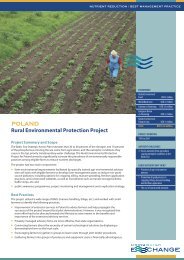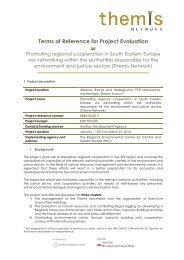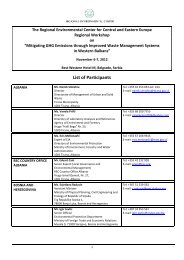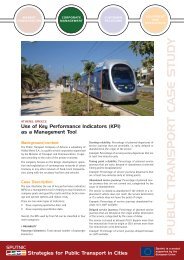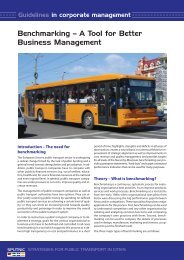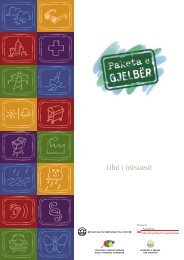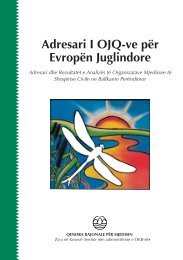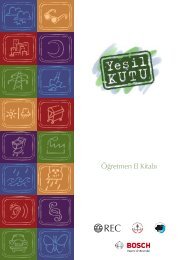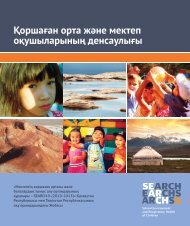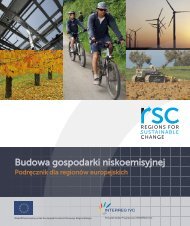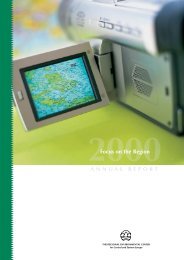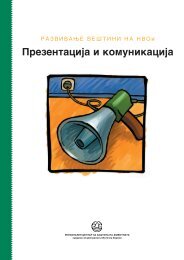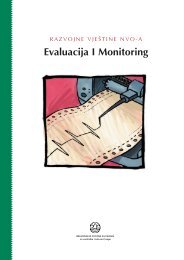Climate Change - The Regional Environmental Center for Central ...
Climate Change - The Regional Environmental Center for Central ...
Climate Change - The Regional Environmental Center for Central ...
You also want an ePaper? Increase the reach of your titles
YUMPU automatically turns print PDFs into web optimized ePapers that Google loves.
IT’S TIME TO ADAPT TO<br />
<strong>Climate</strong> <strong>Change</strong><br />
MEDIATION:<br />
A TOOLBOX FOR ADAPTATION PLANNING<br />
Methodology <strong>for</strong> Effective<br />
Decision-making on<br />
Impacts and AdaptaTION
What is MEDIATION?<br />
“Methodology <strong>for</strong> Effective Decision-making on Impacts<br />
and AdaptaTION”, (MEDIATION) is an FP 7 project, with<br />
the ultimate goal to develop an integrated methodology<br />
to support policy making in the field of climate change<br />
adaptation. It will provide decision makers with a set of<br />
tools and metrics that can be used to meet the field’s<br />
many challenges.<br />
As there is no single way of making policy on adaptation,<br />
the MEDIATION project will develop guidance on several<br />
methods and offer a number of options based on different<br />
cases. Methods can be selected according to the policy<br />
decision context, the available data, the conditions of<br />
applicability, and the objectives of the users.<br />
What is the scope of MEDIATION?<br />
<strong>The</strong> three-year project will mainly focus on the EU-27;<br />
however, countries involved in enlargement as well as<br />
European Neighbourhood Policy (ENP) processes may also<br />
be included (e.g. the countries of the Balkans, Eastern<br />
Europe and Northern Africa). MEDIATION will cover<br />
different vulnerable sectors and areas such as water,<br />
health, urban development, agriculture, biodiversity and<br />
infrastructure. It will also consider different policy<br />
priorities, different administrative and geographic scales,<br />
and different phases in policy development.
WP2, WP3<br />
TOOLBOX WITH<br />
METHODS<br />
AND<br />
METRICS<br />
TESTING, REFINING<br />
STEP<br />
1<br />
2<br />
3<br />
4<br />
WP1<br />
STAKEHOLDERS<br />
& DECISIONS<br />
IDENTIFYING<br />
NEEDS, OPTIONS<br />
MEDIATION<br />
INTEGRATED<br />
METHODOLOGY<br />
SYNTHESISING<br />
META-ANALYSIS<br />
WP4<br />
DEVELOPING<br />
AN<br />
INTEGRATED<br />
METHODOLOGY<br />
WP7<br />
MANAGEMENT<br />
WP5<br />
COMMON<br />
PLATFORM WP 6<br />
DISSEMINATION<br />
& TRAINING<br />
MEDIATION will develop an<br />
integrated methodology <strong>for</strong><br />
adaptation decision making,<br />
which can be applied to various<br />
adaptation challenges, sectors<br />
and political contexts.
Who can benefit from MEDIATION<br />
besides decision makers?<br />
<strong>The</strong> project will be of interest to all those who are<br />
involved in the field climate change impacts, vulnerability<br />
and adaptation. This includes experts working in scientific,<br />
socio-economic and technical research and policy.<br />
What does MEDIATION add to earlier work?<br />
What is new?<br />
<strong>The</strong> uniqueness of MEDIATION comes from coupling<br />
bottom-up (socio-economically orientated) and top-down<br />
(bio-physically orientated) methods of vulnerability<br />
assessment. Also, through the use of “matching methods”,<br />
decision makers and experts can choose among the<br />
analytical tools and methods relevant to their adaptation<br />
challenges within the decision making context.<br />
How does MEDIATION achieve<br />
these objectives?<br />
Based on an inventory of policy needs, MEDIATION links<br />
new and existing methods, tools and metrics to specific<br />
policy questions, and creates an integrated methodology<br />
to support adaptation policy making. To explore the<br />
application of different methods <strong>for</strong> different climate<br />
change adaptation questions, MEDIATION analyses a<br />
diverse set of cases throughout Europe.
What will be the areas of work?<br />
• Analysis of the decision-making context: Knowledge<br />
needs regarding climate impact assessment and<br />
adaptation policy developments will be assessed in<br />
consultation with decision makers from different<br />
levels of government and other stakeholders.<br />
• Inventory, review and improvement of methods and<br />
metrics <strong>for</strong> impacts, vulnerability analysis and<br />
adaptation options: Available methods and tools <strong>for</strong><br />
analysing and assessing impacts, vulnerability and<br />
adaptation options will be identified, including<br />
cost-effectiveness criteria.<br />
• Development of an overarching integrated<br />
methodology: Available knowledge from previous<br />
national and international experience will be<br />
incorporated into an integrated methodology<br />
to analyse and assess impacts, vulnerability<br />
and adaptation options.<br />
• Development of a flexible, interactive common<br />
plat<strong>for</strong>m <strong>for</strong> knowledge sharing: <strong>The</strong> developed<br />
methods will be made available through a common<br />
plat<strong>for</strong>m, designed to last beyond the project’s<br />
lifetime, flexibly incorporating new knowledge.<br />
• Dissemination of this knowledge and training:<br />
<strong>The</strong> project results will be disseminated in Europe<br />
through workshops and trainings.
Partners<br />
Case Studies<br />
MEDIATION Partners<br />
• Alterra – Wageningen UR (NL, coordination) • International Institute<br />
<strong>for</strong> Applied Systems Analysis (IIASA, Austria) • European <strong>Climate</strong> Forum<br />
(ECF, Germany) • Joint Research Centre (JRC/IES, EU) • Potsdam Institute<br />
<strong>for</strong> <strong>Climate</strong> Impact Research (PIK, Germany) • <strong>Regional</strong> <strong>Environmental</strong><br />
<strong>Center</strong> (REC, Hungary) • Stockholm Environment Institute (SEI, UK)<br />
• Finnish Environment Institute (SYKE, Finland) • Universita degli Studi<br />
Firenze (UNIFI, Italy) • Universidad Politécnica de Madrid (UPM, Spain)<br />
• Wageningen University (WUR, Netherlands)<br />
Case studies<br />
Representative case studies (in countries coloured green on<br />
map) from around Europe will serve as the basis <strong>for</strong><br />
assessment of knowledge needs regarding climate impact<br />
and adaptation policy developments at various levels of<br />
government and other stakeholders.<br />
<strong>The</strong> research leading to these results has received funding<br />
from the European Community's Seventh Framework<br />
Programme (FP7/2007-2013) under grant agreement n°244012<br />
CONTACT<br />
Dr. Rob Swart • Alterra, Wageningen UR • P.O. Box 47<br />
6700 AA Wageningen • Tel: +31317481193<br />
www.mediation-project.eu • Email: rob.swart@wur.nl



